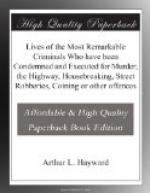After his arrival in England, he wrought for near two years together at his own business, and had the settled intention to live honestly and forsake that disorderly state of life which had involved him in such calamities; but the fear he was continually in of being discovered, rendered him so uneasy and so unable to do anything, that at last he resolved to go over into the East Indies. For this purpose he was come down to Gravesend, in order to embark, when he was apprehended; and being tried on an indictment for returning from transportation, he was convicted thereon, and received sentence of death. During the time he lay under conviction, the principles of a good education began again to exert themselves, and by leading him to a thorough confidence in the mercies of Christ weaned him from that affection which hitherto he had for this sinful and miserable world, in which, as he had felt nothing but misery and affliction, the change seemed the easier, so that he at last began not only to shake off the fear of death, bur even to desire it. Nor was this calmness short and transitory, but he continued in it till the time he suffered, which was on the 5th of July, 1721, at Tyburn. He said he died with less reluctance because his ruin involved nobody but himself, he leaving no children behind him, and his wife being young enough to get a living honestly.
BARBARA SPENCER, Coiner, etc.
Before we proceed to mention the particulars that have come to our hands concerning this unhappy criminal, it may not be amiss to take notice of the rigour with which all civilised nations have treated offenders in this kind, by considering the crime itself as a species of treason. The reason of which arises thus. As money is the universal standard or measure of the value of any commodity, so the value of money is always regulated, in respect of its weight, fineness, etc., by the public authority of the State. To counterfeit, therefore, is in some degree to assume the supreme authority, inasmuch as it is giving a currency to another less valuable piece of metal than that made current by the State. The old laws of England were very severe on this head, and carried their care of preventing it so far as to damage the public in other respects, as by forbidding the importation of bullion, and punishing with death attempts made to discover the Philosopher’s Stone which forced whimsical persons who were enamoured of that experiment to go abroad and spend their money in pursuit of that project there. These causes, therefore, upon a review of the laws on this head, were abrogated; but the edge in other respects was rather sharpened than abated. For as the trade of the nation increased, frauds in the coin became of worse consequence and not only so, but were more practised.




